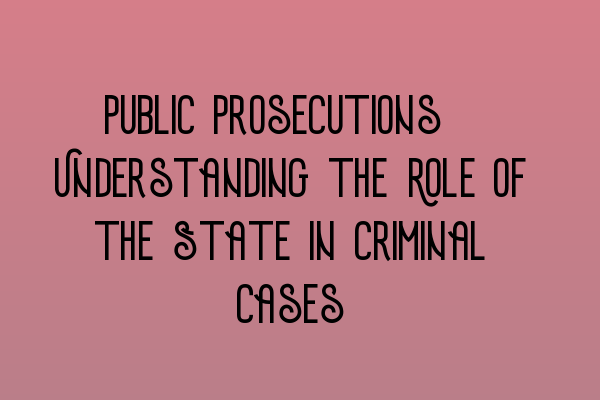Public Prosecutions: Understanding the Role of the State in Criminal Cases
Welcome to another informative article brought to you by SQE Criminal Law & Practice Law UK. In this post, we will delve into the often complex and intriguing world of public prosecutions, aiming to shed light on the crucial role played by the state in criminal cases. Whether you are a law student preparing for the SQE exam or a legal professional looking to expand your knowledge, this article will provide valuable insights.
Understanding the Basics
Public prosecutions refer to criminal cases where the state acts as the prosecuting entity, representing the interests of society. When a crime is committed, it is the duty of the state to investigate, gather evidence, and present the case in court. The purpose of public prosecutions is not only to punish the offender but also to maintain law and order while safeguarding the rights of the accused.
It is important to note that public prosecutions are distinct from private prosecutions, which are initiated by individuals or organizations directly affected by a crime. In private prosecutions, the role of the state is limited, and the burden of proof lies with the private prosecutor.
The Role of the Crown Prosecution Service (CPS)
In the United Kingdom, public prosecutions are primarily carried out by the Crown Prosecution Service (CPS), an independent body responsible for prosecuting criminal cases. The CPS works closely with law enforcement agencies, such as the police, to ensure that cases are thoroughly investigated and prepared for trial.
The CPS carefully assesses each case to determine whether there is sufficient evidence to proceed with prosecution. Factors such as public interest, credibility of witnesses, and the seriousness of the offense are taken into consideration during this evaluation process. If there is a reasonable likelihood of conviction, the CPS will proceed with the prosecution.
Throughout the trial, the CPS represents the state’s interests, presenting evidence, calling witnesses, and cross-examining the defense. Their goal is to prove the guilt of the accused beyond a reasonable doubt, ensuring that justice is served.
Protections for the Accused
While the state carries out public prosecutions, it is essential to recognize the rights and protections afforded to the accused. The principle of “innocent until proven guilty” is a cornerstone of the criminal justice system. The burden of proof rests with the prosecution, and the accused is entitled to a fair trial.
Defendants have the right to legal representation, and if they cannot afford a solicitor, they may be provided with one through legal aid. Furthermore, various safeguards are in place to ensure that evidence is obtained lawfully, witnesses are credible, and the proceedings adhere to established rules and procedures.
Conclusion
In conclusion, public prosecutions play a vital role in the criminal justice system, with the state acting as the prosecuting entity. The Crown Prosecution Service bears the responsibility of investigating and presenting cases in court, aiming to secure convictions and maintain public safety. However, it is essential to remember that even in public prosecutions, the rights and protections of the accused must be upheld to ensure a fair trial.
If you found this article informative, we encourage you to explore our related articles:
- Demystifying the Solicitors Qualifying Examination Format
- LLC Formation Made Simple: Step-by-Step Guide for UK Entrepreneurs
- Business Regulations in the UK: A Comprehensive Overview
- Ethical Considerations in UK Law: Upholding Professional Standards
- Preparing for the SQE Exam: Strategies and Resources for Success
